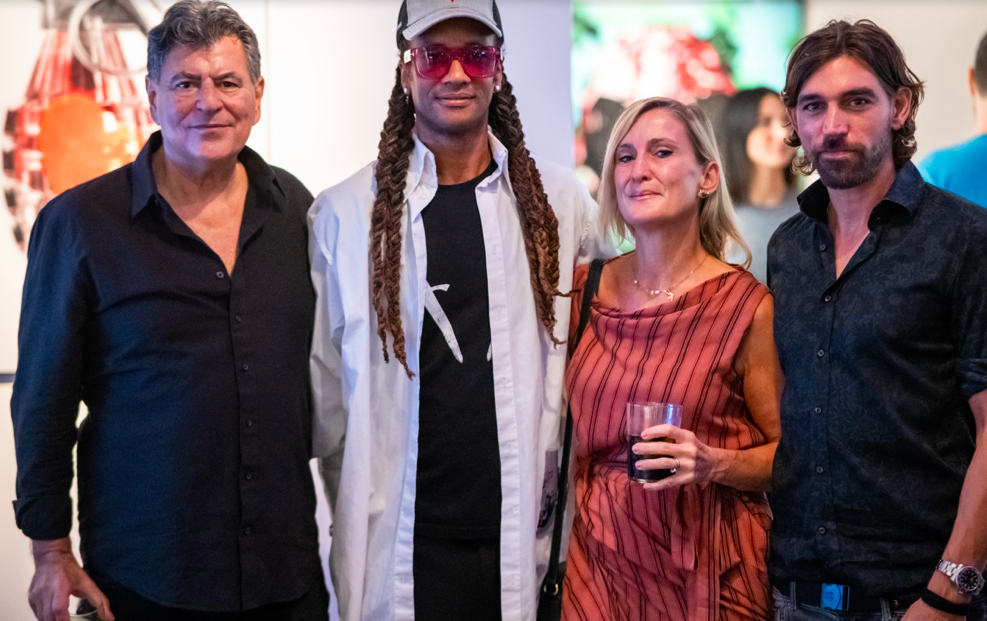Culturalee met Nomaza Nongqunga Coupez, a creative entrepreneur and founder of boutique art agency ‘Undiscovered Canvas’, at Bernard Jacobson Gallery in London this November, where artists mentored by Nomaza were featured in the exhibition ‘Dualities: Women’s Empowerment in Africa’.
Nomaza was born in Ngqeleni in South Africa’s Eastern Cape province and had a successful career as a biomedical technician, before a move to France led to an interest in providing an international platform for promising young African artists. Focussing her attention on mentoring African female artists and equipping them with studio space and materials with which to explore their full potential, Nomaza set up the Makwande Art Residency on the edge of the Mediterranean Sea.
Through Undiscovered Canvas, Nomaza showcases some of the most exciting emerging talent from Africa and the diaspora, and gives the artists access to a new art ecosystem, exposes them to galleries and collectors, and leads to potential partnerships that are key to their market growth and investment potential. In ‘Dualities’ Nomaza presented the art of Lulama Mlambo Wolf, Lesego Seoketsa, Nene Mahlangu and Nthabiseng Boledi Kekana.
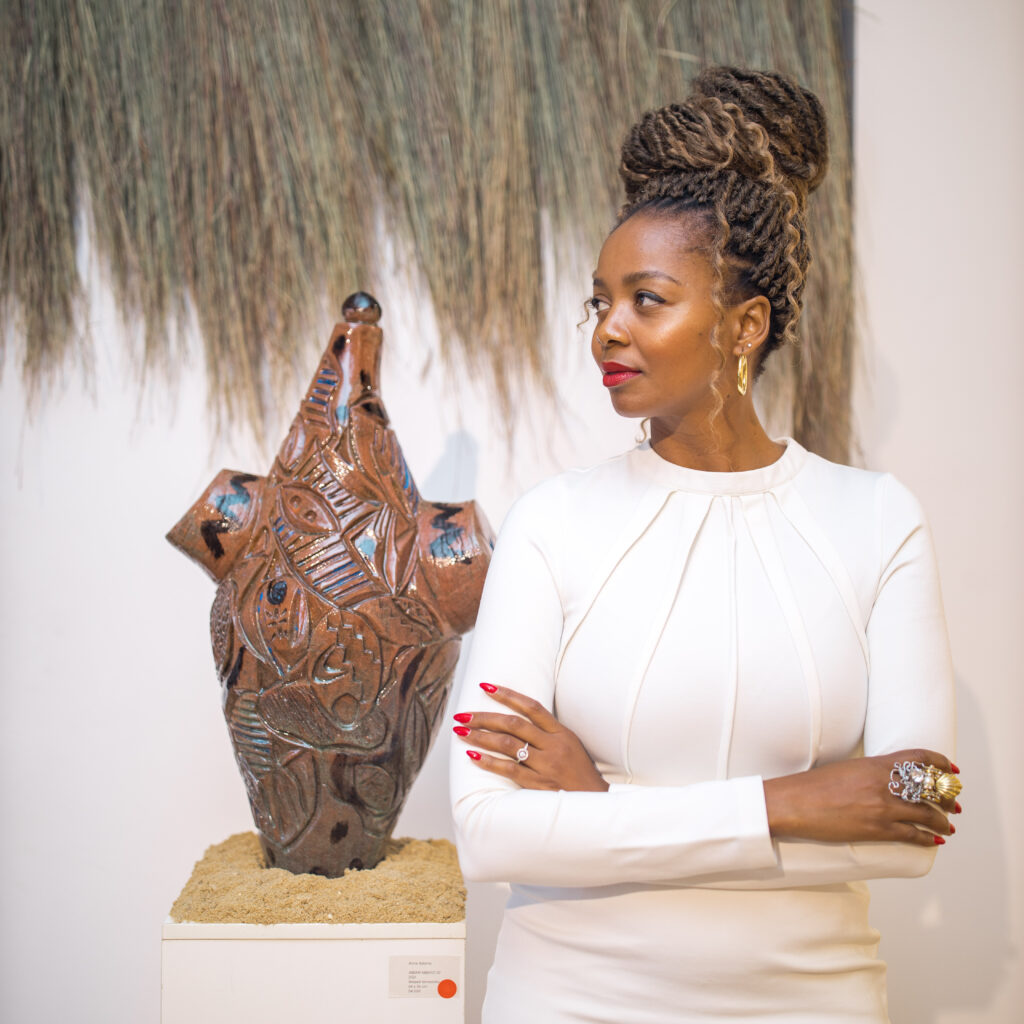
Nomaza Nongqunga Coupez
Culturalee: You were recently involved in the One to One children’s fund exhibition ‘Dualities: Women’s Empowerment in Africa’ at Bernard Jacobson Gallery in London. How did you discover the charity and what was the starting point for this collaboration?
Nomaza Nongqunga Coupez: I discovered the charity during my exhibition in London this year in February 2023, which was at Soshiro in Marylebone. Susan Ansley Johnson, who is a South African now based in London and works for the One to One Children’s Fund, came to see me and discuss the charity. As she was telling me about the crucial work they do, I realised how many common points I personally had with the charity.
Firstly they operate in the rural region of the Eastern Cape, including the village I was born in called Ngqeleni, where they educate women about the HIV virus. Since they started in 2016 they have reduced mother to child transmission to 0%.
Secondly, the Hiv virus is something I have been affected with since my older sister told me she was Hiv positive in 1998. She got infected at the tender age of 19. It is a virus that took my older brother, many family members and friends I grew up with.
So when Susan told me that they were planning a show in London to raise awareness of the work they do in the Eastern Cape and also raise funds, I was honoured that they thought of me.
In this show we wanted to highlight the Empowerment of African Women through entrepreneurship, in the sense that the One to One organisation has been able to reach such great results only because it uses women in the rural areas who are HIV positive ( as 90 % of the Mentor Mothers are HIV +) to go out to their communities, walking at times more than 10 km from one home to another to identify, educate and treat HIV + mothers so that their children are born HIV negative. These Mentor Mothers are paid a salary, and are now able to contribute finacially in their homes, giving them dignity and empowerment,
From Undiscovered Canvas we wanted to show how I empower African female artists through providing them with a rare opportunity where I invite them to France to be part of Makwande Art Residency, a safe, nuanced, and culturally enriching space where African female artists not only create meaningful and progressive work, but also have their careers accelerated into international markets.
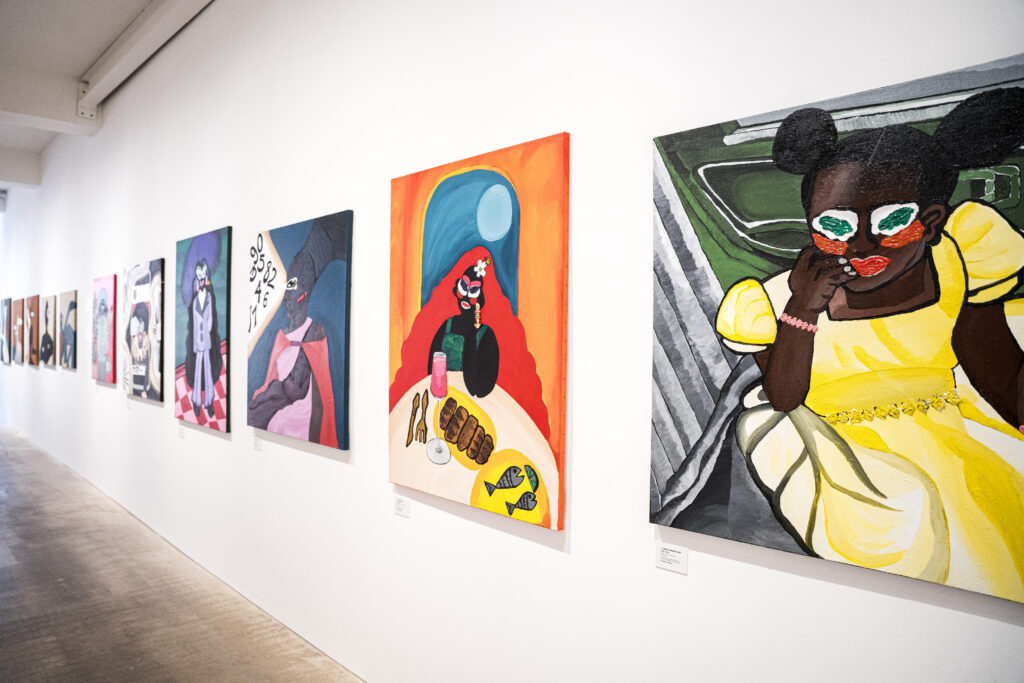
Photo: paintings by Lesego Seoketsa
You founded ‘Undiscovered Canvas’ after moving to South Africa to the South of France, with an artist residency providing studio space and a supportive and nurturing environment for young women artists. What was the motivation to set up the organisation and how do you find the artists that you mentor?
My work through Undiscovered Canvas exposes the unique challenges faced by African female artists in their early careers, mainly lack of financial support, especially during the first three years post graduation. Lack of opportunities and social pressures and expectations from African women in general, often lead them to give up their passion for alternative livelihoods. As a result, we lose critical voices from African women with the capacity to drive change to their societies.
Through Makwande Art Residency we aim to elevate African female artists and lift their work beyond their disadvantaged backgrounds. As our artists succeed, their impact reverberates, inspiring other African female artists to reach for their full potential. We hope to show African female artists that it is possible to live a fulfilled life doing what you love.
Most of the artists I work with are not represented. It’s important to take note of the fact that African female artists are still largely underrepresented and undervalued in galleries, museums and auctions, making up less than a percentile of industry sales. This stunts our common cultural development. I know that through representation we can widen cultural enlightenment, communicating the inherent value to marginalised societies. So I headhunt the artists I work with. I find them in the most unusual places at times.

Nene Mahlangu
You were born in Ngqeleni, a village in the Eastern Cape province of South Africa, and many of the women artists you mentor at Undiscovered Canvas are from the same province. What opportunities does the residency in the South of France provide these women that they wouldn’t have access to in the Eastern Cape, and does this give them a platform for recognition from the international art world?
Most of the artists I’ve worked with did not have representation before I signed them onto Undiscovered Canvas. The platform has given them access to a market they otherwise wouldn’t have had. The visibility we create for them in different spaces and countries opens them up to new collectors, galleries, brands, and other art practitioners. They have access to entire new art ecosystem and those partnerships are pivotal to their market growth and investment potential. My artists have gone on to take part in bigger art fairs because of the notoriety we help them harness.
Examples: most of the artists have never travelled outside of South Africa, and so that alone is a core experience. There are very few international residencies dedicated to African women. Its amazing what a new space, mentally and geographically, can do for creativity. Personal and professional mobility is so empowering. The environment in the South of France has such a strong presence in their artworks. Because they are free from the daily concerns of life, they have room to be brave and really push their boundaries. Luluma developed an expressionist eye after visiting my curations of museums. Lesego started working with Oils and created 3d images. Nthabiseng, who had only worked in her 20 square meter bedroom at home, had the opportunity to use a studio for the 1st time in France. Following the residency, she’s gone to work in her studio in Johannesburg.
There is a huge difference between Before and After with the artists I work with.
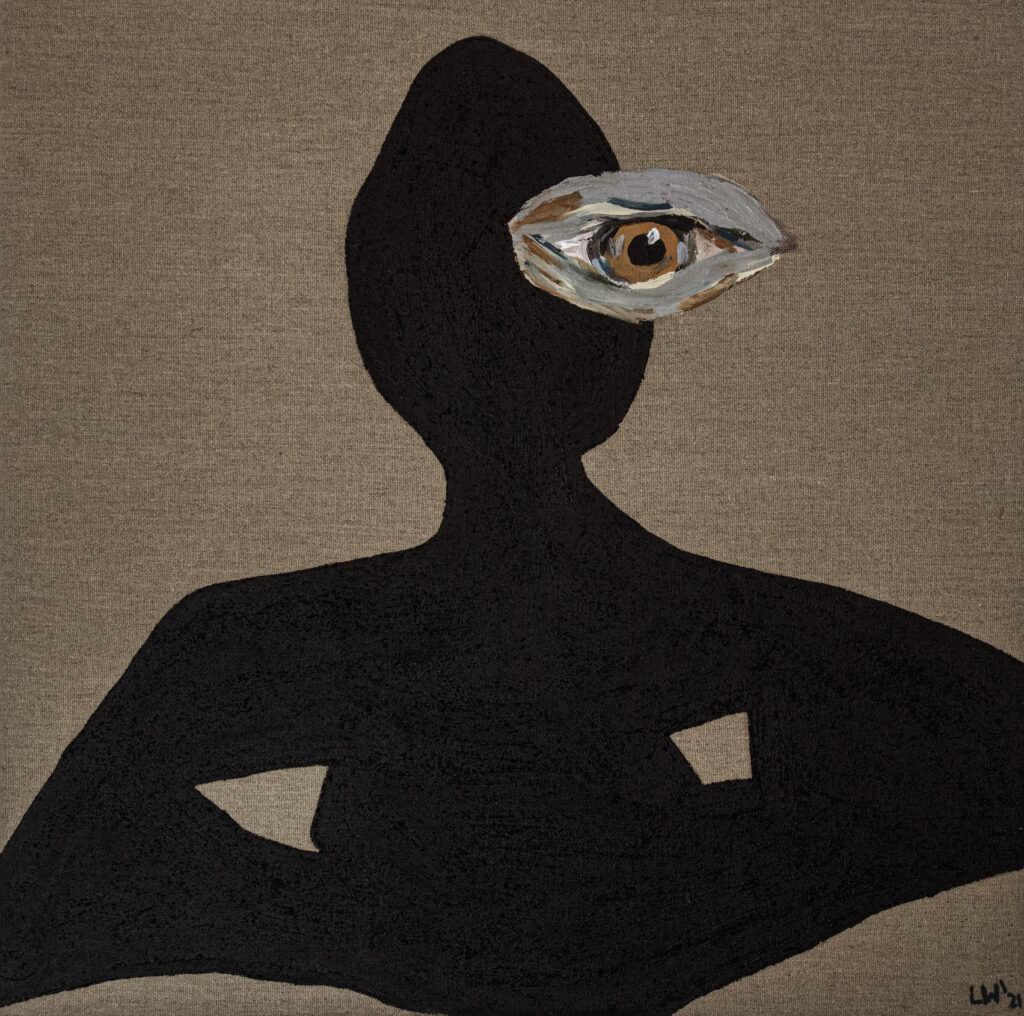
Lulama Wolf
In your earlier career you were a biomedical technician. How did you get involved in the art world?
I studied Biomedical Technology in University and worked for laboratories and pharmaceutical companies before arriving in France. However, when I arrived in France in 2009, I had the opportunity to discover myself. For the first time in my life I was not in a survival mode, and I had time to ask myself the most important question “what is my purpose on this earth?” My journey of self-discovery started and gave birth to Undiscovered Canvas. A boutique agency that promotes young and emerging African artists in France and Globally, and which later on gave birth to Makwande Art residency, a non-profit contemporary visual art organisation that fosters creativity, research, and experimentation through its international residency program for emerging African Female artists.
How was the exhibition received in London, and what will the funds raised from sales of the artwork go towards?
It was extremely well received. London is a huge market for Undiscovered Canvas and just this year I have done three exhibitions there. For this exhibition 15% of the sales will be donated to the One to One Children’s Fund so they can continue doing the wonderful and crucial work in the Eastern Cape of South Africa.
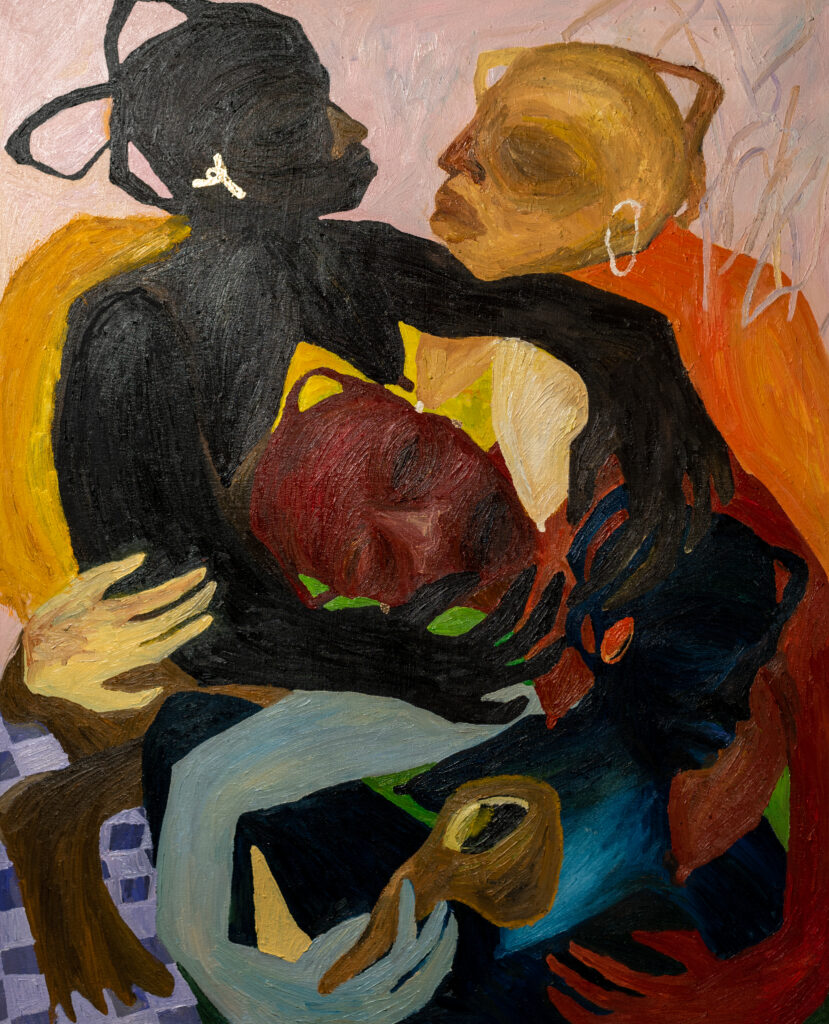
Nthabiseng Boledi Kekana
What projects are you working on next, and who are the artists you are most excited about working with?
For next year I am busy raising funds so that I can welcome another African Female Artist to the South of France in June. I have numerous exhibitions planned between France and the UK, as well to showcase the artists I represent. I am excited about all the artists I work with, as each one brings a different perspective of how they see the world. Through them I learn more about humanity.
Find out more about Undiscovered Canvas here : https://undiscovered-canvas.com



